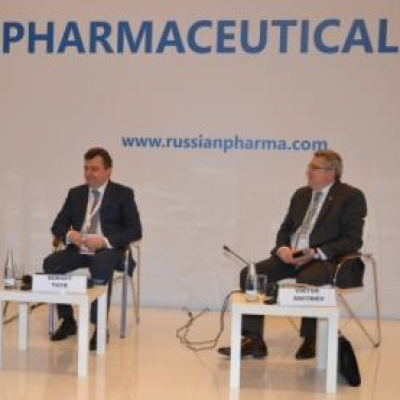Russian Pharmaceutical forum, organized by Adam Smith Institute, took place in Saint Petersburg from 16th to 17th of May. More than 600 people took part in the two days forum, about 100 representatives of pharmaceutical companies, government and experts did presentations related to the pharmaceutical industry.
The participants discussed global trends of the pharmaceutical sector development, innovative initiatives of pharmaceutical companies, also they discussed advantages of the industry in a frame of the Eurasian Economic Union.
Viktor Dmitriev, a CEO of the Association of Russian Pharmaceutical Manufactures (ARPM), did an interview session with Sergey Tsyb, a Deputy Minister of industry and trade of the Russian Federation (Minpromtorg). Minpromtorg is actively discussing questions with the pharmaceutical community about the expansion of government decree №1289, which provides preferences at government auctions to Russian manufacturers. Sergey Tsyb said that government support of Russian manufacturers has already shown the results. “In 2016 compare to 2015 the market share of Russian medicines for HIV treatment increased from 23% to 28%, antituberculous medicines share increased from 49% to 74%. In terms of value the share of Russian medicines exceeds 30%. Today in a list of vital and essential medicines more than 81% of international nonproprietary name (INN) in a finished drug form are produced by Russian manufacturers”, — the Deputy Minister said.
The Ministry is developing two options. The first one is to reject applications, in case if two applications for supply of medicines of Russian made substances are submitted. However, there is an issue that sometimes there are no two Russian substance manufacturers of the exact medicine. The other option supposes the price preferences for suppliers of medicines made of Russian substances, but here is necessary to prevent dumping from the other companies at the market, Sergey Tsyb said. In addition, he mentioned that in a decision-making process the interests of the companies which invested in finished drug form in Russia will be taken into account. “We have to find a balance of interests among the market participants, Russian Healthcare government and Russian economics”, — a Deputy Minister mentioned.
Biopharmaceutical company “AstraZeneca”, a member of ARPM, and a fund “Skolkovo” have agreed about the strategic partnership in research and educational activity in Russia. The agreement has been signed at the Russian Pharmaceutical forum.
“To be a leader in science is an important priority for “AstraZeneca”. We try to make a contribution to develop local R&D projects since we are at the Russian market for decades. We are happy to have such partner like “Skolkovo” which thinks innovatively. I am sure that the developing of our collaborative work will discover new perspectives”, — Irina Panarina, a CEO of “AstraZeneca” in Russia and Eurasia.
For this moment “AstraZeneca” is studying developments of companies-residents of “Skolkovo” in oncology to collaborate in the future. The mutual collaboration in oncology will be in a collective project of innovative mathematical model development which can forecast the therapeutic potential of combinations of new oncological medicines and predict final results of clinical trials of “AstraZeneca” in immunology in Russia.
Kirill Kaem, a Vice President, an Executive Director of “Skolkovo” biomedical technologies cluster, said that the partners have agreed about the support of educational initiatives which are oriented to junior Russian specialists.
At the special session regarding new projects at the vaccine market and the market of immunobiological medicines, Viktor Dmitriev, a CEO of ARPM, emphasized the importance and significance of these products. “Vaccines and immunobiological medicines hardly influence on the biological safety of the country, on infectious diseases, and for sure it is almost impossible to live without them nowadays. That is why there are clear and ambitious objectives to develop vaccine manufacturing, to create appropriate market conditions that commercial non-governmental organizations (NGOs) would be profitable”, — the speaker mentioned.
Vladimir Khristenko, a President of “Nanolek” company, said about the significance of vaccines in Healthcare.
“Advantages of a vaccinal prevention is a possibility to have an absolutely new quality of life for the country and people. Currently there is no any problems with sales and manufacturing of vaccines. Having said that, there is an issue of vaccines shortage in a global world. Manufacturers do not provide countries and NGOs with the required quantity of vaccines. It is hard to go ahead without a collaboration with consumers, worldwide vaccine manufacturers and a real alliance. Including Russia.”, — Vladimir Khristenko mentioned.
In addition, he has demonstrated a comparative statistics regarding vaccines’ prices in Russia and Italy in 2016. There were 1.9 million newborns in Russia in 2016 and the vaccination costs were 5260 RUB per person. Purchase costs of vaccines for the federal vaccination program were 10 billion RUB. In Italy there were 500 000 newborns and the costs per person were 36 000 RUB and 18 billion RUB for the national vaccination program.
“Polysan” scientific and technological pharmaceutical company, a member of the ARPM, is 25 years old this year. During these years “Polysan” has reached the impressive results. The company looks forward optimistically and is not going to slow down the pace of development.
Twenty five years is a substantial period when it is possible to say that the company has passed the time test, hold out in the times of financial crises and operates confidently. At the same time, twenty five years is just a beginning of a long way and a future growth.

